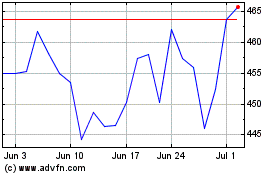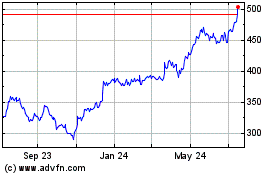Top economic adviser lost effort to stop planned tariffs; exit
could rattle investors
By Nick Timiraos, Peter Nicholas and Liz Hoffman
This article is being republished as part of our daily
reproduction of WSJ.com articles that also appeared in the U.S.
print edition of The Wall Street Journal (March 7, 2018).
Gary Cohn will resign from the White House after 14 months
serving as President Donald Trump's top economic adviser, he said
Tuesday, days after Mr. Trump surprised his senior staff by
announcing steel and aluminum tariffs that Mr. Cohn had
opposed.
During his time at the White House, Mr. Cohn oversaw a major
revamp of the U.S. tax code and pushed a significant rewrite of
financial rules. But the former Goldman Sachs Group Inc. executive
stumbled in an uphill and monthslong fight to sway Mr. Trump
against the tariffs. He was also on the losing side of an effort to
prevent the U.S. withdrawal last year from the Paris climate
accord, and will leave having made little progress advancing a $1
trillion infrastructure program.
Financial markets have seesawed in recent weeks, first on the
prospect that higher federal budget deficits approved by Mr. Trump
might boost inflation and interest rates and more recently because
of his desire to start a "trade war."
Mr. Cohn's departure could further rattle investors. Though not
universally well liked on Wall Street, Mr. Cohn was widely admired
for his market savvy and his pro-trade world view, which many
traders and executives share. The dollar slumped, and futures in
the Dow Jones Industrial Average were down about 300 points, or
1.2%, late Tuesday.
Mr. Cohn said it had been an honor to serve in the
administration as director of the National Economic Council and
thanked the president in a statement. Mr. Trump praised Mr. Cohn's
"superb job" as his economics adviser and called him a "rare
talent."
The White House staff has seen numerous departures over the past
year. A study by the Brookings Institution in January showed
turnover in Mr. Trump's White House surpassed that of the previous
five presidents' first year in office.
Since the study was published, Communications Director Hope
Hicks, Staff Secretary Rob Porter and communications adviser Josh
Raffel have also resigned, among others.
Mr. Cohn was part of a globalist wing of the White House that
lately has been in retreat. Peter Navarro, another adviser who
helped craft the president's protectionist stance in the campaign,
prevailed in a high-profile fight over new tariffs on aluminum and
steel imports. Mr. Cohn had fought internally to stave off the move
and told aides last week he might resign if the president followed
through and imposed the tariffs.
"I don't think he suddenly lost an argument. He just never won
it," said Joshua Bolten, who served as chief of staff to President
George W. Bush from 2006 to 2009. "He's done a very effective job
through rational argumentation and maybe through bureaucratic
maneuvering in staving off the day of reckoning."
As recently as early this week, Mr. Cohn still seemed to be
fighting the decision, trying to put together a meeting among
industry executives whose companies could be hurt by the tariffs.
That meeting, which had been expected to happen later this week,
was no longer being planned following Mr. Cohn's resignation, a
White House official said.
Another White House official said in an interview Tuesday that
Mr. Cohn had always intended to stay for about a year. This person
said that Mr. Cohn wasn't resigning because of frustration or
disappointment over Mr. Trump's decision to impose steel and
aluminum tariffs.
Mr. Cohn wound up staying two months longer than he had
anticipated because the president asked him to help with the State
of the Union speech and a trip to a global economic conference in
Davos, Switzerland, the official said.
Mr. Cohn, though, was unhappy about the "process" by which Mr.
Trump last week announced that he would be imposing steel and
aluminum tariffs, the official said.
This person described the process as one in which White House
proponents of the tariffs, on their own, slipped into the
president's office "at 6 o'clock at night" last Wednesday, then
called steel and aluminum CEOS two hours later and invited them to
a meeting the next morning, telling them the president would sign
an executive order imposing the taxes even though no such order was
ready.
"There is extreme frustration when the process breaks down," the
official said. In this instance, the official said, the White House
"nationalists hijacked the process."
One Wall Street executive who kept in contact with Mr. Cohn said
a rotating group of colleagues and friends took turns urging him to
stay. Some of these people said Mr. Cohn's departure hinted at the
limits of trying to hem in Mr. Trump's desire to take more dramatic
actions on trade.
On Tuesday, Treasury Secretary Steven Mnuchin told lawmakers
that the administration wasn't looking to get into a trade war.
Later in the afternoon, Mr. Trump said, "trade wars aren't so
bad."
The departure will put pressure on other advisers, especially
Mr. Mnuchin, to make the case for preserving the post-World War II
trade architecture the U.S. helped construct and for speaking
credibly to financial markets.
"More than anyone else in the White House, Cohn had credibility
with the markets," said Ian Katz, a financial policy analyst at
Capital Alpha Partners in Washington. "If we go several days
without news of a replacement, investors could get edgy."
The National Economic Council job post doesn't require Senate
confirmation. An administration official said those being
considered to succeed Mr. Cohn include Andy Puzder, a fast-food
executive who withdrew his labor secretary nomination after
domestic-abuse allegations from an ex-wife surfaced. Mr. Puzder has
denied the claims.
The official said others who could be considered include CNBC
commentator and former Trump campaign adviser Lawrence Kudlow;
Council of Economic Advisers Chairman Kevin Hassett; and Mr.
Navarro.
With Mr. Cohn's departure, several Goldman alumni who joined the
administration last year will have left.
"Gary Cohn deserves credit for serving his country in a first
class way, " Goldman Sachs CEO Lloyd Blankfein tweeted Tuesday
afternoon. "I'm sure I join many others who are disappointed to see
him leave." Mr. Cohn had spent 26 years at Goldman was once seen as
the likely successor to Mr. Blankfein.
Mr. Cohn grew up in Cleveland, where his first job was selling
window frames and aluminum siding. He later traded silver on Wall
Street and took a pay cut to join Goldman's commodities arm. He
became a partner in 1994.
He has stayed long enough in the White House to keep
tax-deferred treatment on more than $250 million in Goldman
stock.
Early on, Mr. Trump enjoyed introducing Mr. Cohn as a former
Goldman executive who gave up a lucrative career to work for him.
In a Wall Street Journal interview in July, Mr. Trump mused about
installing Mr. Cohn as the next chairman of the Federal
Reserve.
But that nomination never happened. Mr. Cohn criticized Mr.
Trump's response to the racially charged violence in
Charlottesville, Va., and found himself isolated.
Mr. Cohn found his way back into Mr. Trump's good graces last
fall by shepherding the president's tax cut package through
Congress, delivering the president his signature legislative
accomplishment.
Mr. Cohn performed so favorably that the president discussed
with friends as recently as last month whether to install him as
chief of staff, even though Mr. Cohn is a registered Democrat.
--Rebecca Ballhaus contributed to this article.
Write to Nick Timiraos at nick.timiraos@wsj.com, Peter Nicholas
at peter.nicholas@wsj.com and Liz Hoffman at
liz.hoffman@wsj.com
(END) Dow Jones Newswires
March 07, 2018 02:47 ET (07:47 GMT)
Copyright (c) 2018 Dow Jones & Company, Inc.
Goldman Sachs (NYSE:GS)
Historical Stock Chart
From Mar 2024 to Apr 2024

Goldman Sachs (NYSE:GS)
Historical Stock Chart
From Apr 2023 to Apr 2024
